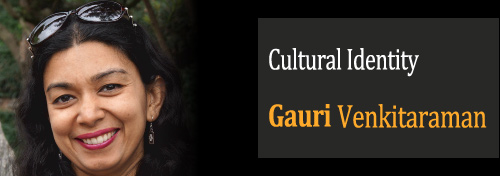Cultural Identity
I’ve always wondered how or if things would have been different for the kids, had we been living in India and not abroad. I don’t quite mean this in the academic sense. I’m looking at this more from the cultural point of view.
I personally feel that growing up abroad, in a lot of ways, insulates children from being exposed to the Indian culture in all its abundant glory – music, Fine Arts, festivals and much more. What they see abroad is a mini version of the culture that one steeps in back home.
My cousins back home don’t necessarily agree with this point of view. “Many of the children out here are so overburdened with school work that they don’t have time to imbibe any of the culture that you speak of. Arrey – end of the day your kids know more about the Indian culture than ours” is what they say.
The last time we’d been to India, people back home were amazed by the fact that The Nutty Siblings have a daily prayer routine and that they chant (and more importantly, understand the meaning of) prayers that some of the adults in India have not mastered as yet. They were amazed by the fact that Macadamia and Pecan were more than familiar with ancient mythological tales and epics like the Ramayana and the Mahabharata. They were quite taken aback with Pecan’s extensive knowledge of Indian history.
That’s precisely my point. Such things should not actually fall into the category of “amazing”. They are something that is expected of children growing up back home in India. So then, why should children growing abroad be given any concession ?
Macadamia and Pecan don’t quite speak our own mother tongue. Macadamia does understand and tries to speak in bits and pieces. Pecan seems more keen on learning Hindi first and when it comes to our mother tongue, he understands a bit but tends to revert to English when replying. Truth be told, it is not a fact I’m proud of. But fact, it is.
But out here, this is a general trend that I’ve noticed. Many of the kids automatically opt for a conversation in English simply because it is easier for them to do so. They have to speak fluent English by the time they’re 3 ½ if they have to get admission in an English kindergarten and from then on the grasp of English keeps increasing. English automatically takes precedence and in the case of Macadamia and Pecan, somewhere along the way, speaking their mother tongue has been totally run off the road. Pecan, who used to speak our mother tongue before he started kindergarten, has more or less tuned it out now.
As parents, the onus is on us now to impart atleast some working knowledge of Hindi and our mother tongue, to both Macadamia and Pecan. And this, we’re beginning to realize, is easier said than done.
Ever heard of the term “Third Culture Kids” ?
Third Culture Kids are those who have spent their growing years in a foreign land and experience a sense of “not belonging” to their passport country when they return to it. In living abroad, they have also missed learning ways of their homeland and feel most at home in the “third culture” that has been created.
This is so true.
Even when we do go over to Bombay, Macadamia and Pecan have not experienced the “real” Bombay – in any sense of the term. They are insulated there too. For them, as of today, Bombay or Kerala are holiday destinations and not their roots. The last time we had been to Bombay and were heading back to HK, I did hear Pecan mentioning to Macadamia “Hey Aparna – today we’re going back home to HK”.
Exactly how much does being a “Third Culture Kid” affect their cultural identity ? Which culture do they identify with later on in life ?
Both Macadamia and Pecan are conversant with Indian customs and traditions, the festivals, what the significance of each festival is, how it is celebrated and why, what are the traditions etc … but when it comes to speech, I’d even go to the extent of saying that they’re more comfortable with Mandarin or Putonghua than they are with their own mother tongue.
We do realize now that as parents with our children growing up abroad, we need to go that extra mile (or make that a few multiple miles) in developing awareness and an appreciation for the “culture” they belong to along with the “culture” they’ve adopted.
The ongoing project – which, needless to say, is going to be a long process – is to try and get Macadamia and Pecan back on line with speaking their mother tongue and Hindi. What I’ve realized over a period of time is that it is indeed the parents’ responsibility to try and keep the languages alive at home and teach the kids to converse in their mother tongue. This would enable them to keep relationships alive with those members of the family who do not speak English. It will help maintain that vital link in The Nutty Siblings’ lives – a link that connects the younger generation to the older generation, a link which is so essential. Simply put, language is that vital link that connects different generations of the family.
Probably, they’d be able to relate better and understand the Indian culture better and to see themselves as a part of their roots. A speaking knowledge of their mother tongue and their national language might well prove to be that crucial fundamental factor which would help them to make sense of which their dominant culture is, as they grow.
There are many of you who are in the same situation as we are today. What are your thoughts on these ? How do you opine ?
A penny for your thoughts ??
Gauri Venkitaraman dons many hats – a wife, a mom, a teacher and many more. Working as a full-time English teacher in HongKong, Gauri also raises and nurtures two terrors, affectionately known as The Nutty Siblings a.k.a Macadamia, a teen and Pecan, the ten-year old who behaves like he is fifteen. Gauri’s family means the world to her. Life is a lively roller coaster ride and we, as a family, aim to enjoy the ride together. http://tiny-tidbits.blogspot.hk/ is where Gauri pens down her thoughts and musings, in an attempt to preserve memories for posterity


